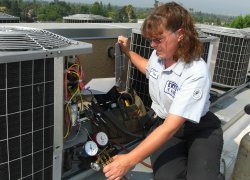Women's Success Stories
 |
STACI ALTEMEYER "I get to wear a uniform that is comfortable, be a hero to the customer, and never have the same boring thing to look forward to tomorrow. I was always good at asking 'why?' and today I know 'how.' The drive is the challenge to find out what the problem is, and the satisfaction is being able to fix it." |
Career Quick Look
| Salary: | $16-$36 per hour | Education: |
| Years in Field: | 6.5 years |
San Jose City College, A.A. Degree in HVACR Currently enrolled in Local 104 Building Trades Service Technician Apprenticeship Program |
| City/State: | San Jose, California |
Getting Started: Staci Altemeyer worked in the restaurant industry for 14 years, starting as a hostess when she was 16, and eventually working her way into restaurant management. Because she wanted to spend time with her children, she left the restaurant business, and started selling puppies, a job which gave her the flexibility she needed to care for her family. Finances were also a factor; she wanted a career where she could earn more. During this time, she began taking courses at Evergreen Valley College and San Jose City College (SJCC). Because her daughter was handicapped and was often ill during this time, it was difficult for her to complete her courses. Eventually, she enrolled in the HVACR program at SJCC because it was across the street from the hospital where her daughter stayed when she was very sick. Entering this program allowed her to complete her courses and still be there for her daughter. Unfortunately, her daughter passed away near the end of Staci's program at SJCC.
Staci continued to sell puppies for another three years, and during the same time she obtained a position at a non-union HVACR company. She learned a lot on this first job, where she did troubleshooting on heating and air conditioning problems, crawled around in crawl spaces and repaired ducts. "What I liked about the service technician job was that I got to work with my hands, and use my brain, and I still got to work with people and talk to people. And the fact that I got to wear a uniform - that was a big one," says Staci.
After three years on that job, she moved on to a union job at Cold Craft, where she worked for one year as a pre-apprentice, and has continued for the past two and one half years as an apprentice, attending the union's required apprenticeship program.
Education: Staci attended San Jose City College and completed her A.A. degree from the HVACR program in 2004. Graduating from this program definitely helped her find her first job in the non-union shop. "San Jose City College did a very good job at preparing me. At the time, I was not working in the field. The whole time I was going to school I had never worked on a unit except for at school. At school, we got to touch equipment, do brazing and soldering, and we made actual refrigerators and did troubleshooting on them. SJCC gave me a very good experience for not being in the field," she says. Staci found the teachers in the Facilities Management program to be very helpful. Staci's boss at Cold Craft recently began teaching at SJCC.
After working in the field for several years, she entered an apprenticeship program supported by her employer, Cold Craft. Although she had already completed the degree program at SJCC, she was required by the union to complete the Local 104 Building Trades Service Technician Apprentice Program in order to complete an apprenticeship and become a Journeyman in her trade. This program requires going to school for two evenings a week at the union hall for five years. Although she is taking similar courses to those in the SJCC program, the apprenticeship requirements have not been a burden. Staci has found the additional schooling quite useful on her job. "You go in to school and say this is what I found, this is what I did, could I have done something different?" She is currently about half way through the apprenticeship program.
Greatest Professional Achievement: Staci counts as her greatest accomplishment the niche she has been able to carve out in the biotech field. "I'm doing work right now in the biotech field as an apprentice that journeymen don't want to do. I work on equipment that most technicians don't know how to work with." An older co-worker who planned to retire worked with her for a couple months and taught her how to work with the specialized biotech refrigeration equipment. When he retired, she took over the account. Recently, she attended a two-day seminar in Chicago to learn more about the equipment. She is pleased to have found a specialty, and believes it gives her job security, since she's the only one trained to work on this equipment in her company.
Barriers: As one of the only women in her classes and at work, Staci says "Being a female, everybody looks at you. You stick out like a sore thumb. If you do well or you make a mistake, everybody knows. That can be good or bad." She reports no problems during her education, except that "In the beginning, guys would try to carry my tool bag for me," says Staci. And with each new class or when a new male started at her work, "the guys would do all the 'manly' work." At first, she resisted their efforts to be helpful. "I had to prove I was as strong as all the guys were, and there were jokes about me being stronger than they were," she says. Now, after being in the field for years, she accepts their help when it's offered and no longer feels the need to prove herself.
Working with Men: "Be yourself," says Staci to women considering working in a male-dominated field. She doesn't like to be around vulgar language or sexual jokes, so when the men around her made such jokes she didn't laugh or join in. "Then everybody got the hint that I didn't appreciate that," she says, and the profanity eventually stopped.
Advice for Women: Staci emphasizes the need for safety for women - and anyone - in this field. At first, she didn't pay enough attention to the safety requirements at her workplace. Recently, she had a couple car accidents, which gave her a bad neck, and also fell off a ladder, sustaining a knee injury. "You've only got one body, and how you treat it is how it's going to treat you. Follow the safety rules, they're there for a reason," she advises.
Typical Workday/Environment: Staci attends weekly meetings at the office, where workers receive safety training, hear office news updates, and report to their co-workers on their successes. At the end of the meeting, they are dispatched to a service call, usually to a residence or business which has no heat or air conditioning. Since Staci only goes into the office once a week, her main office and shop is contained inside her van. Her residential jobs tend to be done in the resident's house, garage, or yard, where commercial jobs are often performed on the roof of the building. She carries a tool bag to troubleshoot problems with heaters and air conditioners. Then she goes to her van to consult her pricing book to see how much it will cost to repair. She develops a quote, presents it to the customer, and attempts to sell the repair. If the repair can't be done that day, she calls the office to get dispatched to her next call.
Each day at 3:30 pm, Staci calls the office and receives the next day's assignments. Since she covers a territory from Gilroy to Palo Alto, some days require a lot of driving between calls. In a typical day, Staci may have two to four calls, each taking one to four hours to complete. The uniform is casual: slacks and a button-down shirt.
Career Ladder: Service technicians starting out on the job may earn $16 per hour, and with advancement into a journeyman position can increase up to $36 per hour. Cold Craft offers a good benefit package, with medical and dental insurance for the whole family, a pension, and paid vacations. Although Staci plans to continue in her niche in biotech, there are many other specialty areas, including supermarkets, large commercial establishments, residential, and refrigeration.
She finds biotech work to be very clean, safe, and professional. However, Staci notes that there are only two or three different models of the minus-80-degree freezers used in biotech facilities compared with the multiple models and brands of air conditioners. Because most of this biotech-specific refrigeration equipment is the same, the work with biotech companies can be repetitive.
Professional Associations: None
Hobbies: Staci is a member of a program called Celebrate Recovery through her church, which helps participants recover from "hurt, habit or hang-up." She sponsors six others in the program. She also enjoys the outdoors, parks, camping, and fishing with her eight-year old son and husband.
 Copyright 2010 National Institute for Women in Trades, Technology & Science | http://www.iwitts.com |


